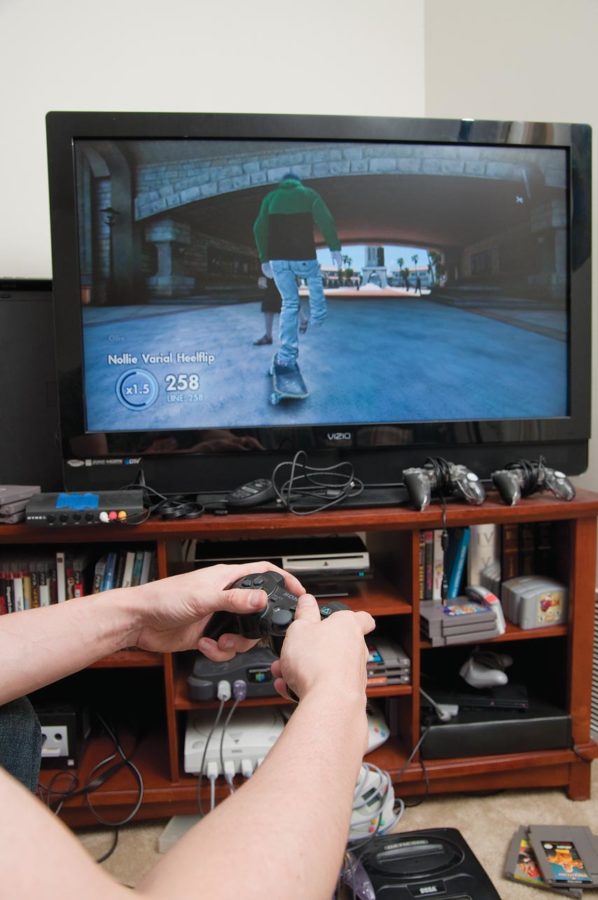Greene: Video games offer progress in areas other than escapism
File photo: Logan Gaedke/Iowa State Daily
Video game technology is extending beyond the typical games to include instructional programs as potential treatments for visions problems and as practice for surgical procedures, among other things.
September 29, 2010
Video games are perhaps the fastest growing form of entertainment media today. As they continue to grow in popularity, game developers are constantly finding new ways to tell engaging stories to more and more people. But is their use limited to a platform for intriguing narrative and escapism?
Using media for educational or instructive purposes is nothing new.
It is widely recognized that movies can help teach a number of things. Instructional videos can show people how to properly use a Shake Weight or familiarize new hires with the sexual harassment policies of their place of business. And where would our generation be if our ABCs weren’t enforced by Big Bird and his posse of friends on “Sesame Street”?
Music has additional advantages as well. For example, theories by Alfred A. Tomatis have suggested that listening to the works of Wolfgang Amadeus Mozart can help improve mental processing. Alternatively, modern country has an effect on listeners that makes them believe they are enjoying something of substance rather than a Frankenstein mixture of pop music and whatever Garth Brooks started.
However, because of their interactive nature, video games can also be a powerful learning, development or therapeutic tool that surpasses other forms of media.
Video games might be able to help treat Amblyopia — commonly referred to as lazy eye. The Helen Willis Neuroscience Institute recently conducted a study that showed that playing standard retail video games can help improve vision for adults with lazy eye. The studies’ 20 subjects, ages 20 to 60, showed a 30 percent increase in visual activity. This is an important discovery because even though Amlyopia can be treated at a young age by placing a patch over the dominant eye, it becomes harder to fix the disorder during adulthood.
A number of studies have also found that video games can increase hand-eye coordination and help surgeons become faster and more efficient at laparoscopic surgery. During certain laparoscopic operations, surgeons follow images on a screen using a device to complete the surgery. Associate professor in the Faculty of Health at York University in Ontario, Lauren Sergio, studied 13 experienced gamers and 13 non-gamers completing tasks that would require the use of hand-eye coordination and the use of a joystick. Brain scans of the subjects showed that gamers actually tended to use different portions of their brain.
Doug Gentile, ISU assistant professor of psychology, has also studied the correlation between video games and laparascopic surgery. He co-authored a study that showed that surgeons who played video games made 37 percent fewer errors, were 27 percent faster and scored 42 percent better overall than non-gamers, in a top laparoscopic training program.
In an effort to put your film appreciation course to shame, “StarCraft” has been on the curriculum for students at University of California, Berkeley. These lucky soles received two college credits — albeit as a pass/fail course — for playing and analyzing the massively popular real-time strategy game.
The syllabus for the course explains that the class will explore the theory of how war is conducted within the confines of the game “StarCraft.” There will be lecture on various aspects of the game, from the viewpoint of pure theory to the more computational aspects of how exactly battles are conducted. Calculus and differential equations are highly recommended. That might not sound like the nights of gaming you’re accustomed to, but it’s not a bad start.
Of course these new applications are not all great. One disturbing example was the U.S. Army’s attempt to recruit youth with the Army Experience Center. This $12 million experiment featured 80 gaming stations and simulators to entice teens into the military.
The recent success of active games such as “Wii Sports” and “Wii Fit” have caused some people to believe that video games can help tackle our nation’s obesity problem. It’s true that flailing your arms around in front of your TV might be healthier for you than playing through a game sitting down, but that is not enough to stay fit. Don’t get me wrong, I welcome opportunities that allow my sister to beat me at video games as much as the next person, — which is the case for Wii Bowling — but do yourself a favor and opt for a soccer ball and some weights over the next video game that has sports, active or fitness in the title.
At any rate, positive developments and uses for video games need to continue. We might be a few years away from being able to list video games as a career development activity on a resume, but that day might not be as far off as you think.







